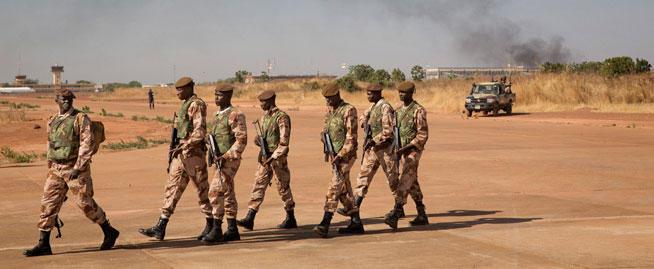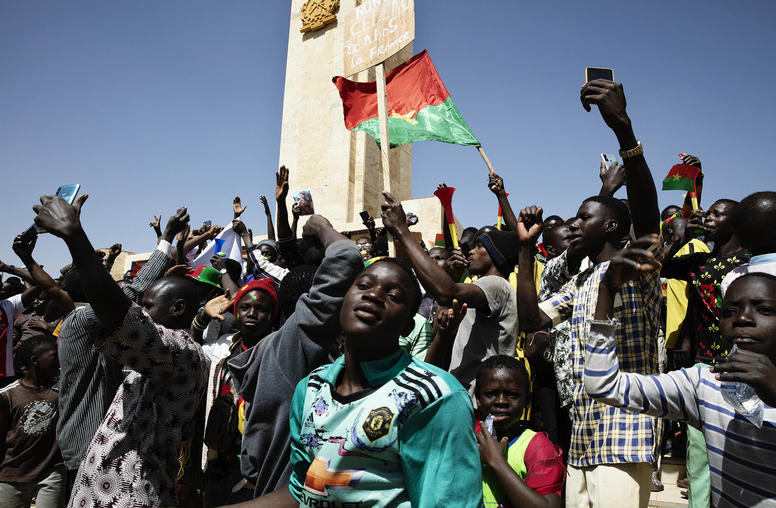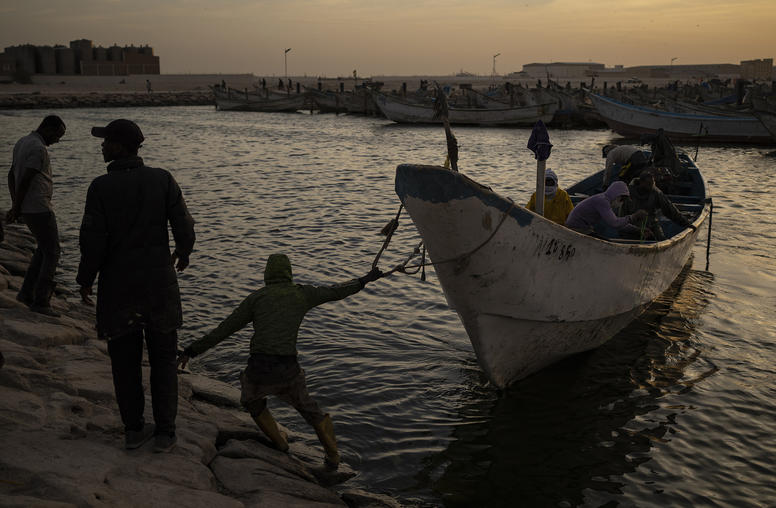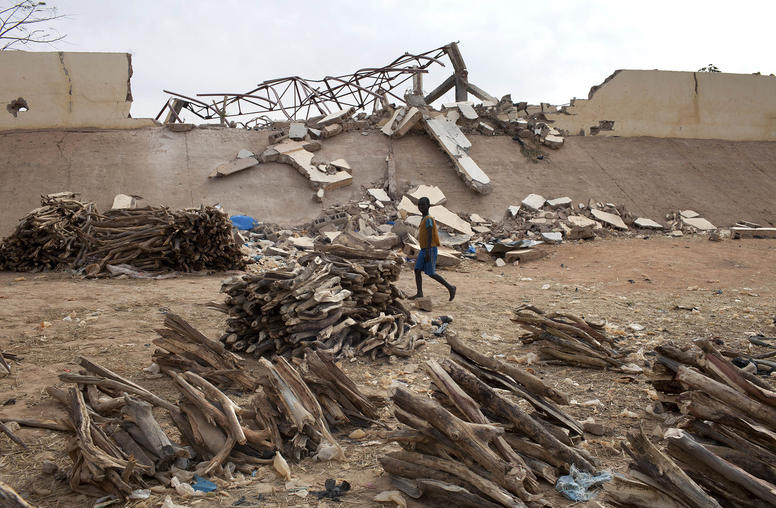How Will France’s Surprise Intervention in Mali Affect a Longer-Term Solution?

France’s military intervention in Mali will fundamentally alter the dynamics of the Malian crisis and the role of the international community in seeking a solution. While that might sound like stating the obvious, it’s important to emphasize the dramatic effect of this military action on the potential for long-term peace and stability.
The international community had planned to take a two-track approach – political dialogue between the government and the rebel groups, and support for the Malian army to ultimately retake the northern part of the country that has been held by Islamist and rebel groups since April 2012. This strategy is now obsolete. Worryingly, the increased focus on military operations is likely to distract from the need for a political solution.
The French intervention on Jan. 11 was a surprise to many because, until last week, France repeatedly declared that there will be no French boots on the ground in Mali. Still, the action is supported by most of the international community. The decision to intervene was a direct reaction to the capture of the city of Konna by three Islamist groups (AQIM, Ansar Dine and MUJWA) and an official request by the Malian government for French assistance.
Konna is strategically important because it is located on the border between the government-controlled southern part of Mali and the Islamist-held northern part of the country. The Malian government and France feared the Islamists could use their capture of Konna for a further push southward, perhaps even toward the capital, Bamako.
France already has gone beyond an “emergency operation” to prevent a further move south by the Islamist groups. It extended its air strikes to northern Mali, including the key cities of Kidal and Gao. French and Malian forces also launched an initial ground operation in the city of Diabaly, which is only 220 miles north of Bamako and was taken by the Islamists after the intervention had started.
United Nations Resolution
These actions overrode the sequence envisioned by United Nations Security Council Resolution 2085, adopted on Dec. 20, 2012. The resolution included support for a political dialogue between the Malian authorities, Ansar Dine (the only of the Islamist rebel groups considered to be a potential partner in negotiations) and the Tuareg rebel group MNLA. The talks were to be mediated by the West African regional organization ECOWAS.
The resolution also endorsed a two-step plan to support the Malian army -- training Malian soldiers and then providing logistical and financial support for an intervention to restore government control of the north. Training was to be undertaken by an African-led force (dubbed AFISMA) and the European Union (including France). Any intervention in the north was supposed to be limited to AFISMA, though with yet undefined western logistical and financial support (but no boots on the ground). On Jan. 14, the U.N. Security Council decided to stick with this framework despite the French intervention.
Instead, any training of Mali’s army will have to take place simultaneously with the combined French-Malian military operation against the Islamists.
France, which plans to increase the number of its troops in Mali to 2,500, has already attracted wide political and logistical support for the operation. The United Kingdom, Germany and other EU member states have promised to provide air transportation. The United States also has received a request from France to help with air transport and refueling, as well as drone and satellite surveillance, but has yet to decide what it will provide.
Whether an international organization will be involved (as was, for example, the case with NATO in Libya) remains to be seen. NATO officials so far deny that they received a request from Paris for the alliance to get involved, and the EU has ruled out serving as a platform for combat operations. A notable development is that Algeria, which was hostile to an external intervention in Mali before France intervened, now supports the action. Algeria isn’t contributing directly to the French operation, but has decided to secure its borders with northern Mali.
In order to garner greater legitimacy and comply with U.N. Resolution 2085, France is eager to get support from the proposed African-led force as soon as possible. Several African states have been quick to offer troops (among them Benin, Burkina Faso, Guinea, Nigeria, Niger, Senegal, Togo and Chad, the latter the only non-ECOWAS member state) and the West African regional organization ECOWAS is trying to accelerate its efforts to speed up the deployment, which was originally scheduled for September 2013.
But when the African force will be established remains unclear, and the details of its mandate are uncertain (will it be tasked with only supporting and training the Malian army, or will it directly conduct combat operations in the north?).
Whatever the role of any African forces, it is unlikely that France will remove its troops any time soon. What is plausible is a scenario comparable to that in Côte d’Ivoire between 2002 and 2004, when France maintained troops in the country alongside an ECOWAS intervention force, but under a separate command.
Political Dialogue
A political dialogue between the various parties, especially between the Bamako government and marginalized groups in the north, remains essential to long-term peace. Both the MNLA and Ansar Dine had recently engaged in tentative negotiations in Burkina Faso. The goal of holding elections in April 2013 will almost certainly be scuttled. The elections were originally scheduled for April 2012 but postponed due to the crisis. This doesn't change the fact that elections will remain an essential step to determine a legitimate Malian government.
A side effect of the French intervention may be to diminish the influence of Captain Sanogo and his supporters, who deepened Mali’s turmoil by staging a military coup in March 2012. Sanogo maintains considerable power and has repeatedly acted as a spoiler to the political peace process.
In December 2012, he demonstrated his influence by forcing then-Prime Minister Cheick Modibo Diarra to resign. Part of Sanogo’s justification was that Diarra lobbied for an external intervention, which Sanogo fundamentally opposed. But since France launched its air strikes on Friday, Sanogo has radically changed course and now openly supports the intervention.
Whether Sanogo will maintain this position and have a more positive effect on the peace process remains to be seen. There are also voices who think that his power might actually increase because he is de facto chief of the military and thus benefits from any military aid that is delivered.
While France’s intervention may be a positive, stabilizing development in the short-to-medium term, it does little to change the reality that Mali is engulfed in a deep political crisis. Ultimately, it is up to Malians to find a way out of that crisis – as past experience in the region and elsewhere shows, international assistance can only do so much.
Do you think there's a way to keep a political process going through this period of the French military operation? If so, what's the best approach?
Tobias Koepf is a Transatlantic Post-Doctoral Fellow for International Relations and Security (TAPIR) at USIP, conducting a research project on French security policy in Africa. Jon Temin is USIP’s director of Sudan and South Sudan Programs and recently hosted a panel discussion on Mali.
Comments:
| Date: Wednesday, January 23, 2012 3:27 PM From: Justin Conklin, Research Assistant at USIP Jennings Randolph Fellowship Program |
|
I agree wholeheartedly with the writers of this blog and the conclusions reached by the panelists who discussed this very issue at USIP a few weeks ago; however, it seems that the situation has reached an impasse. The new status quo now demands a tactically sound strategy by the French in cooperation with ECOWAS, the Malian government, and the UN. Thus far, the military intervention has demonstrated a light-footprint maneuvering that seeks to severely limit civilian casualties. The radical Islamist groups are utilizing this knowledge to hide themselves among the population, camouflage their vehicles, take shelter in people’s homes, and take to the streets at the busiest hours of the day. Any attempt to bridge the societal divide must now adjust itself to meet the new demands on the ground. These insurgent groups have exercised caution to not disturb the local populations too much, even offering compensation for their cooperation. We cannot be certain what the perceptions of these populations are. And it is necessary that a counter-narrative strategy be employed to gain support for the intervention. The parties to the conflict then need to be differentiated, and the Malian government must play an instrumental role in defining terms that can be accepted by all rational parties to the conflict (i.e. those whose aims are not to destabilize the region). The French must hasten cooperation with regional players to demonstrate that this is not simply a neocolonial power play. And in the midst of intervention, those who are capable must identify the individuals who can and should take part in a mediated peace and coordinate a path for bilateral and multilateral communications towards these ends. |
| Date: Monday, January 21, 2012 3:27 PM From: |
|
Is it possible to get the people themselves directly involved in peace negotiations? Do something such as what was done in Somalia (see video). The idea is to work with the one group that might be possible to negotiate with. Get them and the northern people working on enforcing peace and pushing out non-peaceful forces. By getting women and mothers involved and in control, they all might like the idea of not sending their family members out to die in a needless war. By having the opposing sides working together towards negotiating, maintaining, and enforcing peace, a long-lasting peaceful solution is more likely. |
| Date: Friday, January 18, 2012 5:09 PM From: RK Smith |
|
A UN Security Council Peace Keeper force with USIP and US State Department special mission components supporting ECOWAS initiatives could coordinate and provide mediation-peace, local law enforcement, para-military training with commercial multi-national communication systems accessing near-real time ISR regional data. The introduction of ISR data to social media networks removes many covert operational advantages normally favoring armed forces. Using readily available ISR data in conjunction with US State current social media initiatives eliminates fog and friction in public actions based on ground truth data across the Mali AOR. Volunteer UN Peace Keeper support enables short term (1-5 years) logistics supply chains to develop local commercial markets, ECOWAS-Mali trade, raise economic bases and improve public education to provide citizens with knowledge needed for international trade and free elections. Major world universities & institutes need encouragement to provide faculty, students & resources in direct support of local action across ECOWAS cultures for community education and open borders. Mid-term (5-15 year) activities involve turn over & mentoring of Mali commercial activities to local cadres selected from ECOWAS-UN 2-4 year training programs. Mali effective commerce and trade will support and evolve their infrastructure to permit free local, regional and national elections. New multi-cultural Mali communities may have limited interest in issues that seemed critical to dominant cultures or generations (15-50 years). Respectfully, RK Smith |
| Date: Friday, January 18, 2012 10:49 AM From: Marije Balt, ex-diplomat |
|
Many opportunities were lost for genuine political dialogue in the past. Yes, whenever conflict broke out, Touaregs and other groups got invited to the table in order to commit to peace agreements, in return for 'peace dividend'. But many of those millions of peace dividend were usurped by the Bamako government ('budget support'): not a good basis for dialogue between Bamako and the north, where frustration built up steadily. The international community, including France, never really insisted on a genuine dialogue; their support even exacerbated the divide between north and south, the neglect of the north and therefore the influx of illegal groups. So for a longer term solution, we have to take into account the root causes of the grievances in the north, while dealing with the terrorist problem. |



